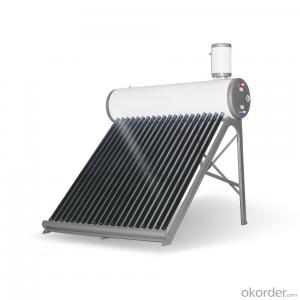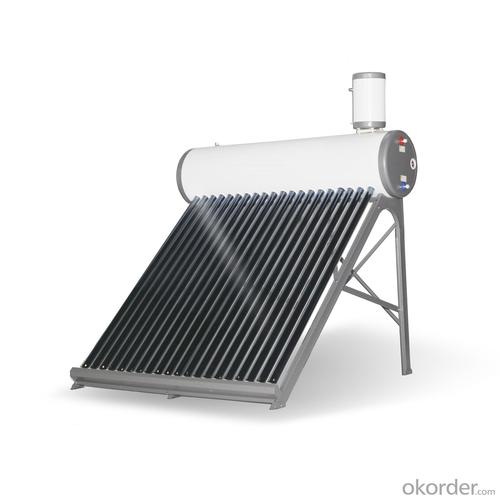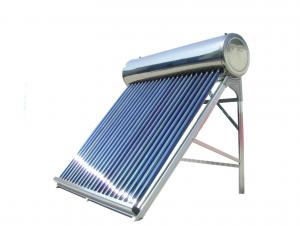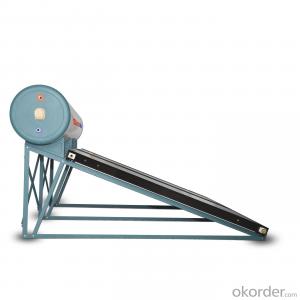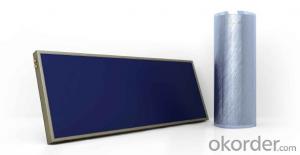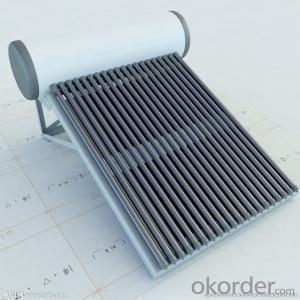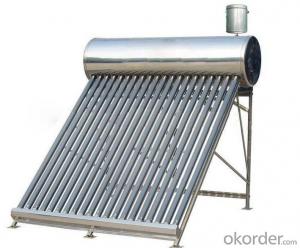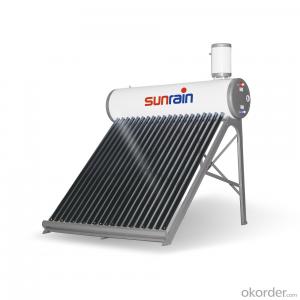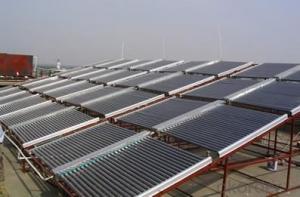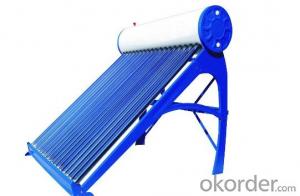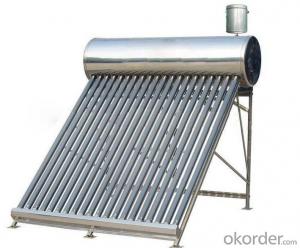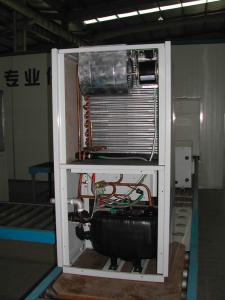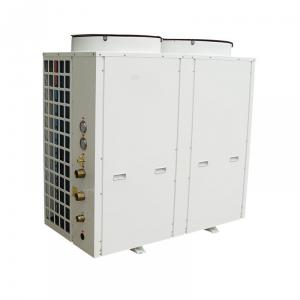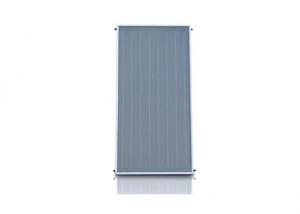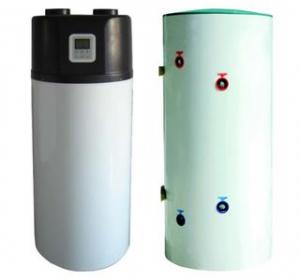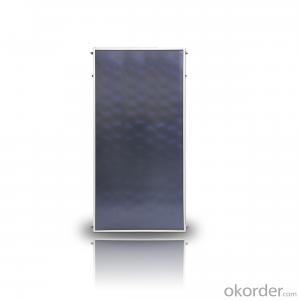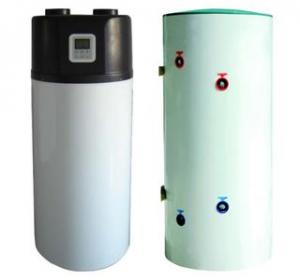12V Solar Water Heater - Pressurized Heat Pipe Solar Water Heater
- Loading Port:
- China Main Port
- Payment Terms:
- TT OR LC
- Min Order Qty:
- -
- Supply Capability:
- -
OKorder Service Pledge
OKorder Financial Service
You Might Also Like
Free Maintenance
No glycol, simple structure. No annual and periodical check-ups or maintenance is necessary. Blind sleeve design, no pollution, no-leaking heat pipe, easy installation. No water in vacuum tubes, one broken tube will not affect the function of the whole system.
High Performance
With the cutting-edge vacuum-tube collecting technology, over 92% of sunshine energy is converted to thermal energy for heating and no circulation loss. Thicker insulation layer, functioning well in winter, even in minus-30-degree environment.
High Reliability
System is simply working with the city net water, without pumps. Inner tank made by stainless steel SUS316-1.2mm. Working with high pressure, directly connected to running water, automatically functioning. With T/P valve and exhaust valve, it protects the tank from shrinking.
Year-round Operation
With the freezing-proof technology, the system is designed and installed to operate for all seasons. Electric heater is optional to use, to ensure plenty hot water in rainy days.
Customer-friendly
Vacuum tubes are directly connected to the tank, low heat loss. Blind sleeve design and SUS316 inner tank is suitable for poor quality water supply area. Aluminum alloy frame is optional. Install angle(degree): 30/45. Pipe location on the tank is optional. It’s cheaper than split pressurized system.
- Q: Are there any safety considerations for installing a solar water heater?
- When installing a solar water heater, there are various safety aspects that need to be taken into account. Firstly, it is essential to have a qualified professional install the system in order to minimize any potential electrical or structural problems. This involves adhering to all building codes and regulations. Secondly, it is crucial to take precautions to prevent overheating. Solar water heaters have the ability to reach high temperatures, which, if not properly regulated, can result in scalding or even an explosion of the storage tank. To prevent such incidents, it is vital to install a temperature and pressure relief valve. In addition, it is important to consider the weight and stability of the solar water heater system. The storage tank and collector panels can be quite heavy, so it is imperative to ensure that the roof or supporting structure is capable of handling the weight. Proper anchoring and bracing should be utilized to prevent any accidents or damage caused by strong winds or earthquakes. Furthermore, regular maintenance and inspections are necessary to keep the system in optimal working condition. This includes checking for leaks, ensuring proper insulation, and regularly cleaning the collector panels to maximize efficiency and prevent any hazards. Lastly, it is crucial to adhere to all instructions and guidelines provided by the manufacturer when installing and operating a solar water heater. This guarantees that the system functions correctly and safely, minimizing the risk of accidents or injuries. To summarize, safety considerations for installing a solar water heater encompass proper installation, preventing overheating, ensuring structural stability, regular maintenance, and following manufacturer's instructions. By addressing these safety aspects, homeowners can enjoy the benefits of a solar water heater while minimizing any potential risks.
- Q: Solar energy or electric water heater for domestic hot water
- Solar water heater with auxiliary electric heater is recommended in the case of solar water heater installation.
- Q: Are there any specific building codes or regulations for installing a solar water heater?
- Yes, there are specific building codes and regulations for installing a solar water heater. These codes vary depending on the location and jurisdiction, but they typically cover aspects such as system design, equipment specifications, installation requirements, and safety measures. It is important to consult with local authorities or building departments to ensure compliance with these codes and regulations before installing a solar water heater.
- Q: Can a solar water heater be used in areas with limited access to financial resources for installation or maintenance?
- Yes, a solar water heater can be used in areas with limited access to financial resources for installation or maintenance. Solar water heaters are relatively low-cost and low-maintenance systems compared to other types of water heating technologies. They can be constructed using locally available materials and simple designs, making them affordable and easy to install. Additionally, solar water heaters have minimal ongoing maintenance requirements, reducing the need for expensive repairs or replacements. Therefore, they offer a viable and sustainable solution for providing hot water in areas with limited financial resources.
- Q: Can a solar water heater be used in areas with limited access to skilled workforce or trained technicians for installation or maintenance?
- Yes, a solar water heater can be used in areas with limited access to skilled workforce or trained technicians for installation or maintenance. Solar water heaters are designed to be relatively simple systems that can be installed and maintained by individuals with basic technical skills. They often come with detailed installation and maintenance manuals that provide step-by-step instructions for the process. Additionally, many solar water heater manufacturers offer training programs and resources that can help individuals in these areas learn the necessary skills for installation and maintenance. These resources may include online tutorials, video guides, or even on-site training sessions. By providing accessible and user-friendly resources, manufacturers aim to empower individuals in areas with limited access to skilled labor to install and maintain solar water heaters themselves. Furthermore, solar water heaters are generally designed to be durable and require minimal maintenance. They are built with high-quality materials and components that can withstand various weather conditions and last for many years with minimal maintenance. This reduces the need for frequent technical interventions, making them suitable for areas where skilled workforce or trained technicians may be scarce. Overall, while having access to skilled workforce or trained technicians can be beneficial, it is possible to install and maintain a solar water heater in areas with limited access to such resources. With proper guidance, training, and durable design, individuals in these areas can successfully utilize solar water heaters to meet their hot water needs.
- Q: How does a solar water heater affect water heater maintenance requirements?
- A solar water heater can significantly reduce water heater maintenance requirements. Since solar water heaters use the sun's energy to heat water, they have fewer mechanical components compared to traditional water heaters. This means there are fewer parts that can malfunction or require regular maintenance. Additionally, solar water heaters often have a longer lifespan compared to conventional models, reducing the need for frequent replacements or repairs. Overall, the maintenance requirements for a solar water heater are generally lower, resulting in cost savings and less hassle for homeowners.
- Q: What are the components of a solar water heating system?
- The components of a solar water heating system typically include solar collectors, a heat transfer fluid, a storage tank, a backup heating system, and a control system.
- Q: Can a solar water heater be used for industrial purposes?
- Yes, a solar water heater can be used for industrial purposes. It can effectively heat large volumes of water using solar energy, reducing the reliance on conventional heating methods and lowering energy costs for industrial processes such as cleaning, sterilization, and manufacturing. Additionally, solar water heaters are environmentally friendly, helping industries reduce their carbon footprint and contribute to sustainable practices.
- Q: Can a solar water heater be used in areas with strict building aesthetics requirements?
- Yes, a solar water heater can be used in areas with strict building aesthetics requirements. Solar water heaters come in various designs that can be integrated into the building's architecture, such as concealed or flat-plate collectors, to comply with aesthetic guidelines. Additionally, some solar water heaters offer customization options, allowing them to blend seamlessly with the building's design while still harnessing solar energy for water heating.
- Q: How does the angle of the solar panels affect the efficiency of a solar water heater?
- The angle of the solar panels directly affects the efficiency of a solar water heater. The optimal angle for the solar panels is dependent on the latitude of the location. If the angle is too steep or too flat, it can result in less efficient absorption of solar energy. The correct angle allows the panels to capture the maximum amount of sunlight, optimizing the efficiency of the solar water heater.
Send your message to us
12V Solar Water Heater - Pressurized Heat Pipe Solar Water Heater
- Loading Port:
- China Main Port
- Payment Terms:
- TT OR LC
- Min Order Qty:
- -
- Supply Capability:
- -
OKorder Service Pledge
OKorder Financial Service
Similar products
Hot products
Hot Searches
Related keywords
